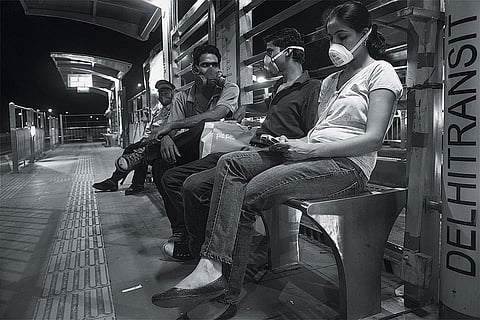Then the traveller in the dark
Thank you for your tiny spark,
How could he see where to go,
If you did not twinkle so?
Our Starless Skies: Even Stars Are Unable To Break Layers Of Smog
The sky is infinite and there are millions of stars. But, in a city where smog hangs like a veil over us, the stars don’t shine anymore.
Twinkle, Twinkle, Little Star by Jane Taylor
In the strange bubble of this smog smothering us, I remember when I first learned this poem. Like the child who wonders about stars and says he does not know what stars are. But he knows they twinkle. Now, when I open the window, I gaze at a deprived sky. I remember the stories about stars.
In the story about the birth of Jesus, the star was the miraculous sign, guiding the Magi to Bethlehem. As children, we drew stars on paper. We named them after our dead. I look up at the sky and I see no stars. The sparks have abandoned us. A little girl told me once it is the end of the world when stars hide themselves.“Where have the stars gone?” she asked.
In this city, we have lungs that are grey and black. In this city, we see no stars. The end of the world is a prophecy, a poem, a crisis, a continuum of “breaking news” and of politics, of “othering”, and of exclusion. Even the stars are unable to break the layers of smog that covers this city. That could be a metaphor for our politics too.

They say that air pollution is a great equaliser. But the rich can change the air, make it less toxic in their homes. They can shut the windows of the homes and the cars. Air purifiers, gas masks, etc. But the poor barely get to eat. They die. From hunger. From breathing the toxic air. We don’t care. We build factories. We construct highrises where the poor work. We never compensate them for being victims of an apocalyptic present that is built on the argument of development. After all, development is necessary for the larger good, they would say. The rich and the powerful live insulated lives. When the lockdown was announced in 2020, the Prime Minister asked people to stay home to break the virus chain. He forgot the homeless and the migrants. They walked home. Thousand of kilometres. We forget the poor often.
***
Someone told me the sky is infinite and there are millions of stars. The sky is now a newspaper obituary page. A black/blank page. In a city where smog hangs like a veil over us, the stars don’t shine anymore. In the stores, they sell star-shaped fairy lights. On the wire, they look like stars hung out to dry. Yellow, bright and very unreal. In the stores, they sell stars made of paper. In gold and silver. And in red and blue. These paper stars hang on the windows in the house in the living memory of the stars that have abandoned us. Or perhaps we have abandoned the stars. And the ceiling becomes the sky. Not the infinite kind. And I can’t make up my mind whether I like to be lost in the infinite graveyard that the sky is. Losing one’s way among the tombs can be dreadful, and there is no twinkle in the sky to help us navigate.
***
In this city, leaves gather dust and fumes. They look like obituaries of themselves. Pollution is discussed in rooms fitted with air purifiers. We click our tongues and try to buy extra time with money to ward off death by pollution.
The little girl must believe in miraculous stars. And the stories of stars. She must not inherit a bleak sky. Let the sky be. Let the air be kind. If we can’t give the poor dignity and food and rights, let us at least give them a sky full of stars.
(This appeared in the print edition as "Our Starless Skies")
ALSO READ